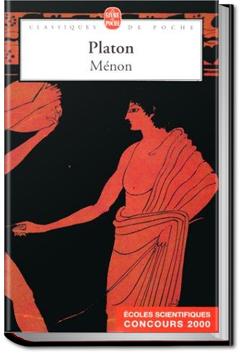UNLIMITED Audiobooks and eBooks
Over 40,000 books & works on all major devices
Get ALL YOU CAN for FREE for 30 days!
Meno
Plato
Book Overview:
Meno is a Socratic dialogue written by Plato. Written in the Socratic dialectic style, it attempts to determine the definition of virtue, or arete, meaning in this case virtue in general, rather than particular virtues, such as justice or temperance. The goal is a common definition that applies equally to all particular virtues. Socrates moves the discussion past the philosophical confusion, or aporia, created by Meno's paradox (aka the learner's paradox) with the introduction of new Platonic ideas: the theory of knowledge as recollection, anamnesis, and in the final lines a movement towards Platonic idealism.. (Introduction by Wikipedia)
Meno is a Socratic dialogue written by Plato. Written in the Socratic dialectic style, it attempts to determine the definition of virtue, or arete, meaning in this case virtue in general, rather than particular virtues, such as justice or temperance. The goal is a common definition that applies equally to all particular virtues. Socrates moves the discussion past the philosophical confusion, or aporia, created by Meno's paradox (aka the learner's paradox) with the introduction of new Platonic ideas: the theory of knowledge as recollection, anamnesis, and in the final lines a movement towards Platonic idealism.. (Introduction by Wikipedia)
How does All You Can Books work?
All You Can Books gives you UNLIMITED access to over 40,000 Audiobooks, eBooks, and Foreign Language courses. Download as many audiobooks, ebooks, language audio courses, and language e-workbooks as you want during the FREE trial and it's all yours to keep even if you cancel during the FREE trial. The service works on any major device including computers, smartphones, music players, e-readers, and tablets. You can try the service for FREE for 30 days then it's just $19.99 per month after that. So for the price everyone else charges for just 1 book, we offer you UNLIMITED audio books, e-books and language courses to download and enjoy as you please. No restrictions.
Try now for FREE!

"Love your service - thanks so much for what you do!"
- Customer Cathryn Mazer
"I did not realize that you would have so many audio books I would enjoy"
- Customer Sharon Morrison
"For all my fellow Audio Book & E-Book regulars:
This is about as close to nirvana as I have found!"
- Twitter post from @bobbyekat



Community Reviews
And how will you enquire, Socrates, into that which you do not know? What will you put forth as the subject of enquiry? And if you find what you want, how will you ever know that this is the thing which you did not know?
Reading this dialogue immediately after reading the Protagoras confronts the
I was told that there would be no math.
Nije ni skroz loša ova 2020, trošim vreme na gomilu online predavanja. Među njima je i Ancient Philosophy: Plato & His Predecessors, besplatno na Courseri. Usput vidim da se Država može čitati i treći put, ali se sa Menonom dosad nisam susretao. Ovde se Sokrat pita "da li se vrlina može naučiti ili
This is my new philosophy read of the year...at the end of the year. This is Plato's dialogue about the idea of virtue in-general. Meno asks Socrates what virtue is and how do people get it. Of course, this being Socrates the answer or question can not be that simple. First, Socrates wants to define
Bununla birlikte Platon'un birinci bölüm eserlerini bitirmiş oldum :))
Celebrity Death Match Special: Plato versus Isaac Asimov, part 2 (continued from here)
[A spaceport on Trantor. SOCRATES and R. DANEEL OLIVAW]
OLIVAW: How are your researches progressing, Socrates?
SOCRATES: Alas, poorly, good Olivaw.
OLIVAW: I am sorry to hear it. We hope that you may yet discover the